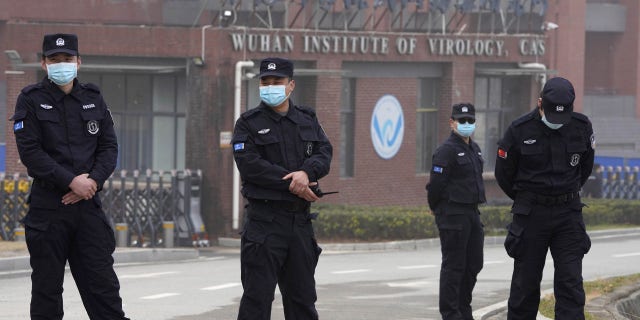Gain-of-function research conducted at the Wuhan Institute of Virology has widely been suspected as a source of the pandemic.
“What they were doing at the Wuhan Institute of Virology was taking dangerous, scary viruses and making them scarier,” Jamie Metzl of the Atlantic Council told Fox News.
In basic terms, the point of gain-of-function research is to make a virus more dangerous. Scientists argue that, with this research, they can be prepared to handle it if one day the virus were to mutate naturally. However, critics argue that if viruses evolve in that way, it might take thousands of years, or it might never happen at all. Scientists are often doing gain-of-function research for months for no practical purpose, such as using it to build their own resumes.
Dr. Shi Zhengli, known as the Wuhan Institute ‘Bat Lady’ reportedly worked with military officials at the lab, despite denying it. (APTN)
But whatever the motive is, today the research continues around the world, with little oversight, and often funded by taxpayers.
The National Institutes of Health (NIH), which approves funding for these projects, said, “While such research is inherently risk, the risk of not doing this type of research and not being prepared for the next pandemic is also high.”
HHS, NIH UNDER FIRE FROM HOUSE GOP SEEKING ANSWERS ON WUHAN’S COVID ORIGINS
There have been repeated allegations and denials that such research, funded by the NIH, was going on in Wuhan, China.
Dr Anthony Fauci was adamant in an outburst with U.S. Senator Rand Paul, R-Ky., back in 2021.
“You are entirely, entirely and completely incorrect that the NIH has not ever and does not now fund gain-of-function research in the Wuhan Institute,” Dr. Fauci insisted to Sen. Rand Paul.
But his argument relies on semantics.
The NIH watered down its definition of gain-of-function over the last decade to get around a funding pause. The funding pause was put in place after accidents involving an engineered bird flu.

Dr. Anthony Fauci, White House Chief Medical Advisor and Director of the NIAID, gives and opening statement during a Senate Health, Education, Labor, and Pensions Committee hearing to examine the federal response to COVID-19 and new emerging variants on January 11, 2022, at Capitol Hill in Washington, D.C. Senator Rand Paul, a Republican from Kentucky, speaks during a Senate Health, Education, Labor, and Pensions Committee hearing in Washington, D.C., U.S., on Tuesday, Jan. 11, 2022.
(Photo by GREG NASH/POOL/AFP via Getty Images | Photographer: Greg Nash/The Hill/Bloomberg via Getty Images)
Now the NIH defines gain-of-function research as “research involving enhanced potential pandemic pathogens.” After the NIH changed the definition of gain-of-function research, it was able to avoid the classification in Wuhan after Eco Health Alliance argued that these particular bat viruses did not spread among humans – even though they were planning to test how the viruses would mutate to threaten humans.
“There were lots of warnings that Chinese science was becoming an increasing threat to the rest of the world” says Metzl.
FAUCI’S GAIN-OF-FUNCTION RESEARCH AND WHY I’LL CONTINUE TO HOLD HIM, HIS ALLIES ACCOUNTABLE
Almost all experts argue that Eco Health Alliance’s research clearly comes under the gain-of-function umbrella. But it’s not just the classification, it’s the way the NIH approves the funding for this kind of research which is also opaque.
For example, in 2012 after the accidents with bird flu, a funding pause was put in place and an NIH review group was set up to oversee any funding of this kind.
The group was known informally as a “Ferrets Committee,” but nobody knows who was on it. The group’s work was confidential and no records of its proceedings are public.
Then in 2017, the NIH watered down this committee’s power to block projects; recasting the panel as strictly an advisory body, which effectively put all the power back in the hands of the NIH.
The NIH was basically overseeing itself, and that continues to this day. The funding pause was lifted using the new definition, and it was back to business as usual.

Security personnel gather near the entrance of the Wuhan Institute of Virology during a visit by the World Health Organization team in Wuhan in China’s Hubei province on Wednesday, Feb. 3, 2021. (AP Photo/Ng Han Guan)
On top of all this, an independent review process is supposed to be carried out before any funding of risky research goes ahead, but experts involved have told Fox News that the reviews are often not done, done poorly or simply ignored. Experts all argue it has to change.
Doctor Roland Weisendanger said, “We need independent agencies to control this, like for nuclear power reactors.”
Australian professor Nikolai Petrovsky said, ‘Not all gain-of-function research sets out to create harmful pathogens, but it can happen by accident. That is unfortunate, but we should not throw the baby out with the bath water as a result.”
“We have to be careful to distinguish what might be just a chance event in a laboratory where a virus became adapted to human cells, and from there was able to jump from a Petri dish to one of the people handling that virus. And that would have no sinister connotations at all. We have to accept there is some risk of laboratory experiments, and we try and manage those risks that we shouldn’t be banning laboratory experiments,” Petrovsky explained.
Republican congressmen on Thursday called on the seven scientists who reversed their opinions about the lab-leak theory in Wuhan to provide answers under oath after scientists changed their views after speaking with Dr. Fauci and Dr. Francis Collins.
Last year, the State Department acknowledged that the Wuhan Institute of Virology had not disclosed gain-of-function research linked to the bat related coronavirus and had engaged in research on behalf of the Chinese military. Many experts agreed that has really changed – particularly when it comes to China.
“China is, in many ways, a wild west of scientific research,” Metzl said.
The point is, however you look at it, and whether you acknowledge there must be some risk for scientific progress – or whether you believe this is tampering with nature unnecessarily – that almost everyone should agree that this is a murky world, where scientists hide behind classifications, and shifting definitions, all without having to disclose exactly what the purpose of the research is.
CLICK HERE TO GET THE FOX NEWS APP
Certainly there is a growing belief in government that a 9/11-style commission needs to look into the origins of COVID-19, and into how taxpayer dollars are used to fund gain-of-function research to ensure that another pandemic never happens again.